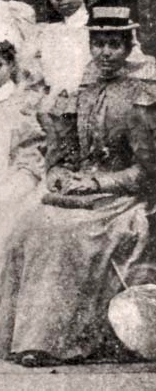Lucy Hughes Brown on:
[Wikipedia]
[Google]
[Amazon]
 Lucy Hughes Brown (April 12, 1863 – June 26, 1911) was the first African-American woman physician licensed to practice in both North Carolina and South Carolina and the cofounder of a nursing school and hospital. Hughes Brown was also an activist and poet.
Lucy Hughes Brown (April 12, 1863 – June 26, 1911) was the first African-American woman physician licensed to practice in both North Carolina and South Carolina and the cofounder of a nursing school and hospital. Hughes Brown was also an activist and poet.
 Lucy Hughes Brown (April 12, 1863 – June 26, 1911) was the first African-American woman physician licensed to practice in both North Carolina and South Carolina and the cofounder of a nursing school and hospital. Hughes Brown was also an activist and poet.
Lucy Hughes Brown (April 12, 1863 – June 26, 1911) was the first African-American woman physician licensed to practice in both North Carolina and South Carolina and the cofounder of a nursing school and hospital. Hughes Brown was also an activist and poet.
Early life and education
Lucy Hughes Brown was born an orphan inMebane
Mebane is a city located mostly in Alamance County, North Carolina, United States, and partly in Orange County, North Carolina, Orange County. The town was named for Alexander Mebane, an American Revolutionary War general and member of the Unite ...
, North Carolina, on April 12, 1863 . She attended Scotia Seminary
Scotia is a Latin placename derived from ''Scoti'', a Latin name for the Gaels, first attested in the late 3rd century.Duffy, Seán. ''Medieval Ireland: An Encyclopedia''. Routledge, 2005. p.698 The Romans referred to Ireland as "Scotia" around ...
in Concord, graduating in 1885. At Scotia Seminary, she met Sarah Dudley Pettey
Sarah Dudley Pettey (1869-1906) was an African-American educator, writer, organist, and political activist in North Carolina. She devoted her life and career to increasing gender and racial equality, Christian temperance, and women's participation ...
who introduced her to activism. She went on to study at the Woman’s Medical College of Pennsylvania
The Woman's Medical College of Pennsylvania (WMCP) was founded in 1850, and was the second medical institution in the world established to train women in medicine to earn the M.D. degree. The New England Female Medical College had been established ...
, graduating with her medical degree in 1894. She was one of fifty-two women in her class. She was also a delegate of the National Federation of Afro-American Women and attended their conference in Washington DC in 1896.
Poetry
After graduating from Scotia Seminary, Hughes began writing poetry. Her two most notable poems are called "Thoughts on Retiring" and "A Retrospective".Career
Lucy Hughes Brown was granted her license to practice in North Carolina in May 1894, and was one of three women who were licensed that year. Hughes Brown was the first African American woman licensed to practice medicine in North Carolina.Gertrude Ramsey, “Pioneer Women Doctors Early Found Favor in N.C.” Asheville Citizen-Times, march 6, 1949 Brown practiced medicine in Wilmington, North Carolina for two years, and then in 1896 she and her husband moved toCharleston
Charleston most commonly refers to:
* Charleston, South Carolina
* Charleston, West Virginia, the state capital
* Charleston (dance)
Charleston may also refer to:
Places Australia
* Charleston, South Australia
Canada
* Charleston, Newfoundlan ...
, SC. She was also South Carolina's first African American woman physician.
By 1900, Hughes Brown resided in Charleston at 11 Nassau street, Dr. Brown was listed as a physician in the city directory, and advertised her services in the paper.
She joined with other black professionals—including Dr. Alonzo Clifton McClennan
Alonzo Clifton McClennan (May 1, 1855 - April 14, 1912) was an African-American medical doctor who was the co-founder of the Charleston Hospital and Training School for Nurses in Charleston, South Carolina, established to provide for the educatio ...
—to cofound the Canon Hospital and Training School for Nurses in 1897. At the Canon Hospital and Training school, she taught Obstetrical Nursing and Care of Infants. She was head of the school's department of nursing and its associated training program, which graduated its first class in 1898. Brown also was associate editor of the state's first black medical periodical, the ''Hospital Herald'', which was founded in 1898. In 1902, the ''British Journal of Nursing'' recognized her as a leader in her profession in South Carolina.
Brown died in Charlotte on June 26, 1911.
Family Life
In 1889 she married David Brown, a clergyman and teacher. Hughes Brown moved to South Carolina because of her husband’s work; Reverend Brown was the principal ofWallingford Academy
Wallingford Academy was a school for "Colored" children in Charleston, South Carolina. It was organized by Jonathan C. Gibbs a minister with the Zion Presbyterian Church and opened in 1865. David Brown, a clergyman and teacher moved to Charlest ...
, a school for African Americans that was set up in 1865, and was organized by a minister with the Zion Presbyterian Church. At the time of Hughes Brown's death, the family had moved to Charlotte, North Carolina, where the Reverend David Brown taught at Biddle University, a “Presbyterian school for males”Charlotte City Directory, Piedmont Directory Company, 1911, p. 126
References
Further reading
* Martin, Maxine Smith. "Dr. Lucy Hughes Brown (1863–1911): A Pioneer African-American Physician". ''Journal of the South Carolina Medical Association'', vol. 89 (January 1993), pp. 15–19. {{DEFAULTSORT:Brown, Lucy Hughes 1863 births 1911 deaths American women physicians 19th-century African-American physicians 19th-century American women physicians 19th-century American physicians Physicians from South Carolina People from Mebane, North Carolina Physicians from North Carolina 20th-century African-American people 20th-century African-American women